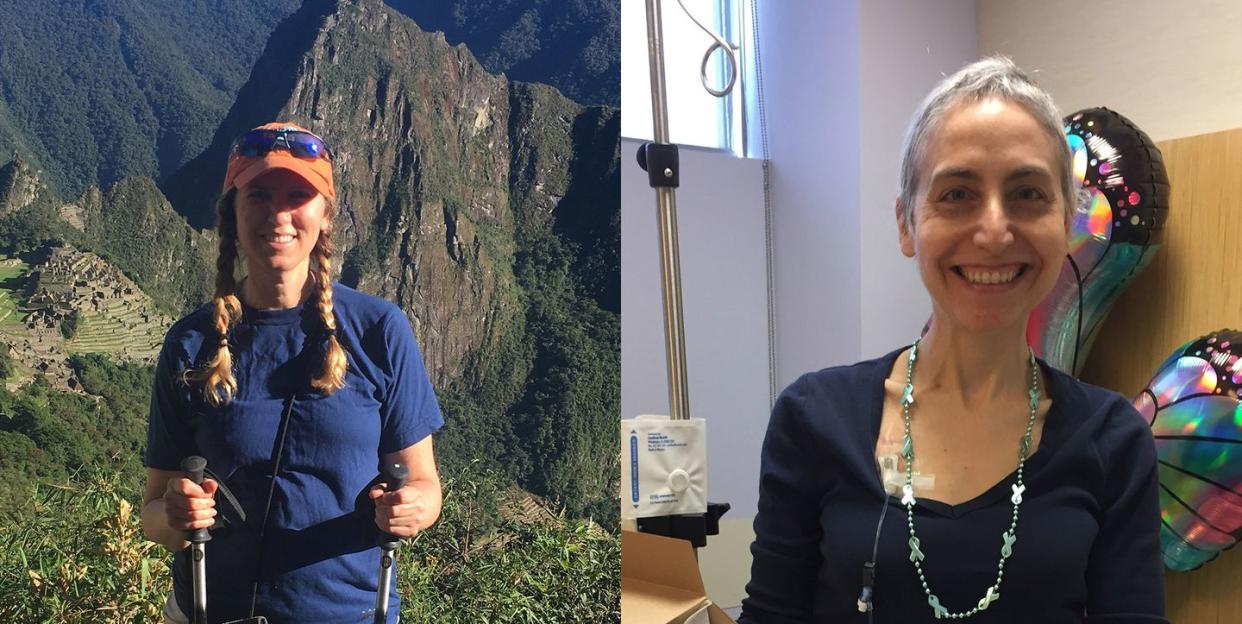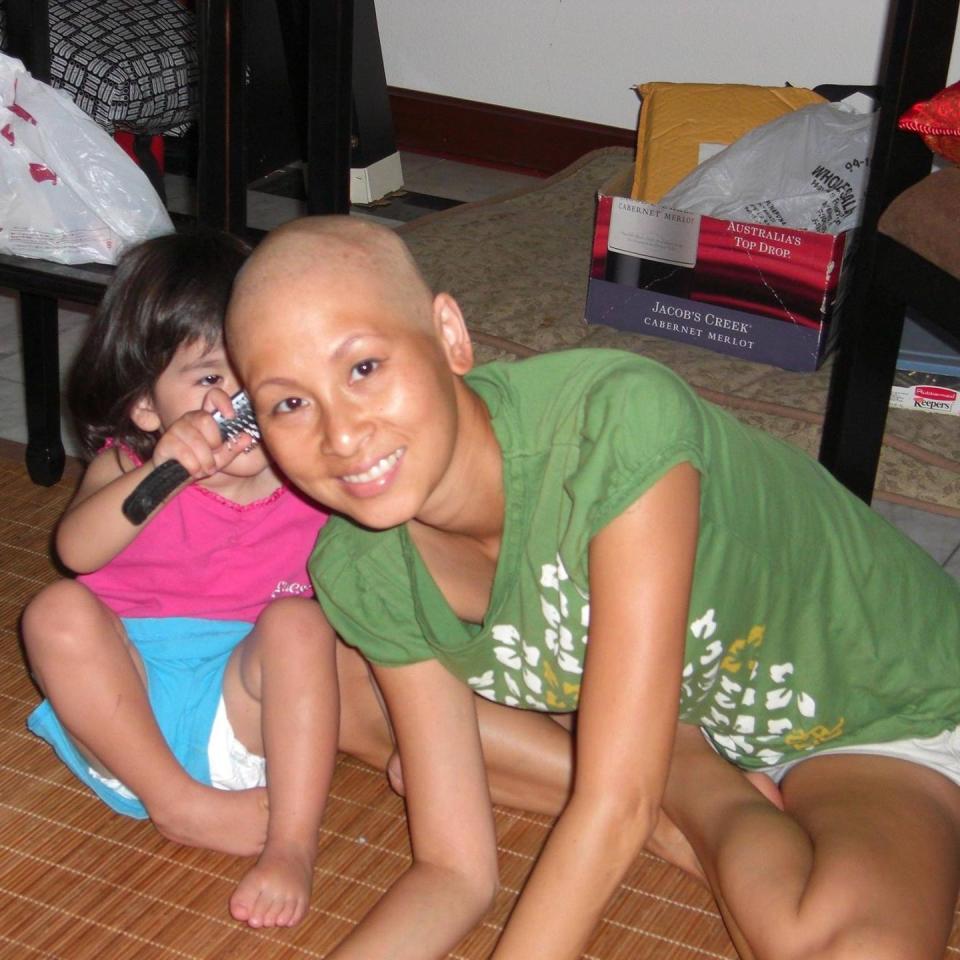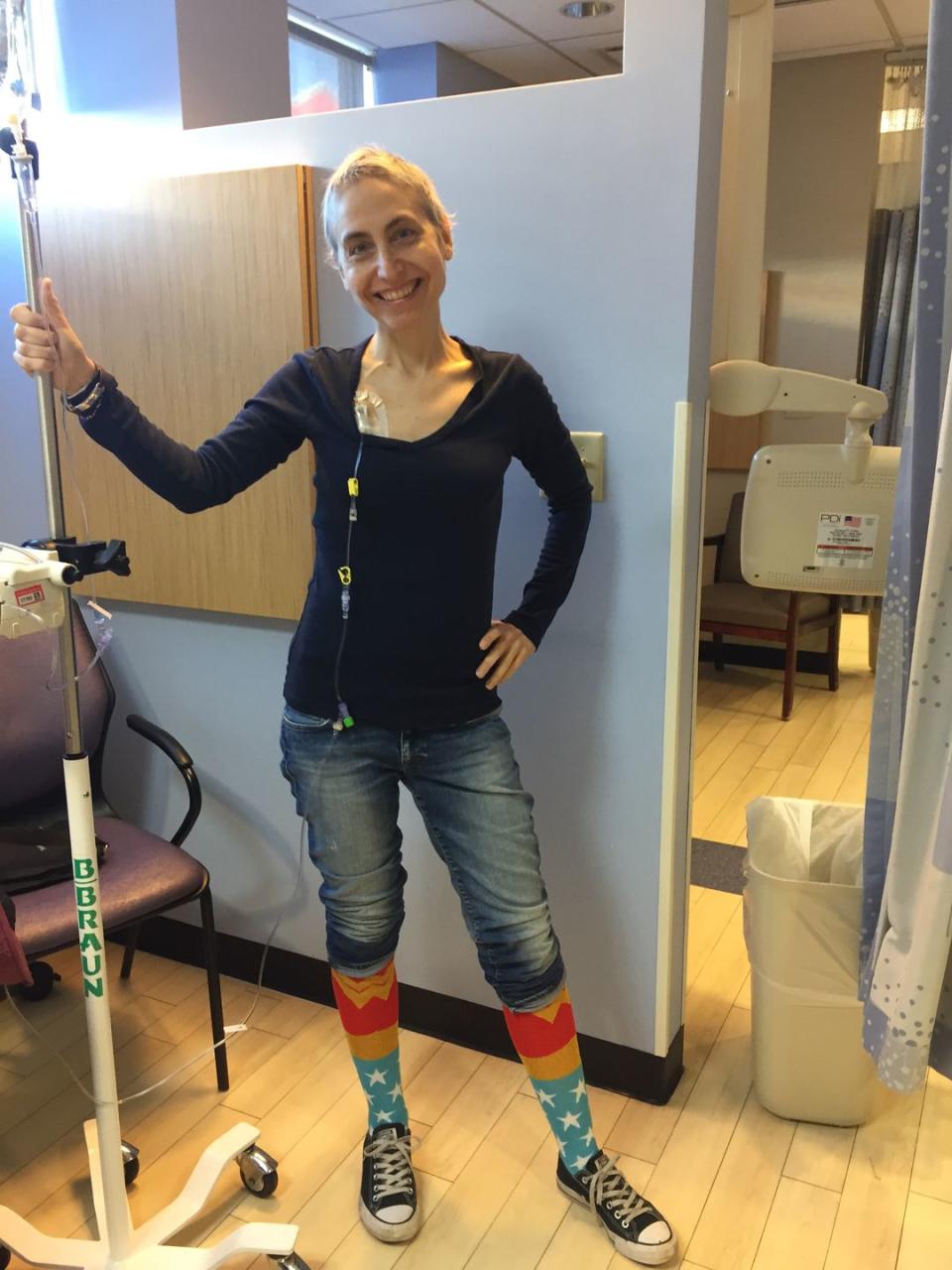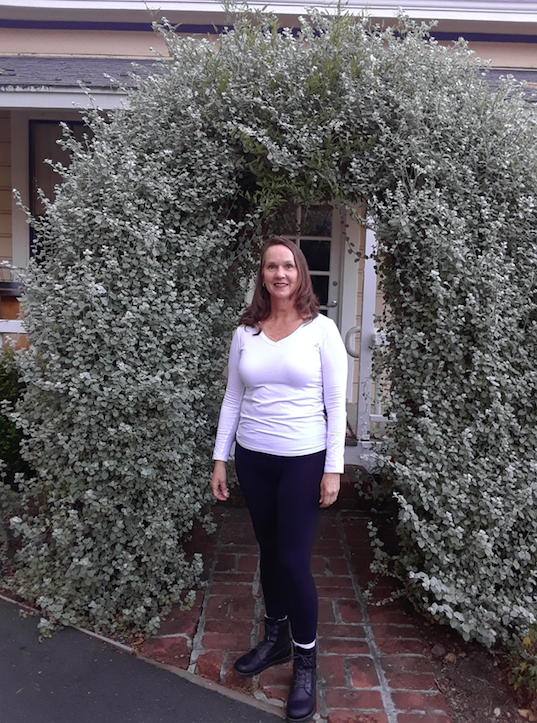5 Women Get Real About What It’s Actually Like Having Ovarian Cancer

This year, about 22,530 women will receive a ovarian cancer diagnosis and about 13,980 will die from the disease, according to the American Cancer Society. And while you can find plenty of articles on the risk factors, symptoms, and treatment options, there's no way to prepare for facing ovarian cancer head on.
Hearing from survivors can help, though. That's why we asked five women to share their cancer journeys with us, and reveal what they wish people knew about fighting for your life. Each story is unique, but many spoke about the importance of trusting your body, finding support, and the realities of infertility after treatment.
If you or someone you love is facing ovarian cancer, consider calling the Cancer Support Community Helpline at 888-793-9355 or SHARE helpline at 844-275-7427 for support.
Marcia, diagnosed at age 27

At age 27, Marcia Donziger was newly married and ready to start a family. But her entire life changed after a trip to the gynecologist for what she thought was a UTI. After hearing a bit about her symptoms, her doctor decided to do an ultrasound and discovered a tumor, which she thought was benign and recommended having removed. “OK, but be sure I can still have children,” Donziger told her.
She woke up from the surgery to the terrible news that they found cancer spread throughout her abdomen and had to perform an emergency hysterectomy.
“It was devastating to hear it was ovarian cancer and I was now infertile. My life changed forever,” she says. “I lost the ability to have children just as I was preparing to start a family.”
“My friends were getting married and starting to get pregnant,” she continues. “When one of my best friends got pregnant two months after my diagnosis, I was happy for her, but it brought up tremendous feelings of grief.”
Donziger, now 49, met with an oncology social worker to help work through what she was feeling. “I didn't realize that I needed to systematically experience the stages of grief for an unborn child. Doing this under the guidance of a social worker was a healthy part of the recovery process that I recommend to anyone experiencing deep loss,” she says.
She later used a surrogate and egg donor and now has twin 13-year-old boys.
Tracy, diagnosed at age 36

Tracy Maxwell arrived in the emergency room around 3 a.m. on New Year's day in 2006 with severe abdominal pain. Doctors found a cyst on her ovary that had burst, so her gynecologist monitored it for a few months before removing it.
The day after surgery, the doctor's office called: “The doctor wants to talk to you about the pathology of your cyst,” they said. “I knew it was bad news,” says Maxwell, then 36. When she met with her doctor, she learned she had granulosa cell ovarian cancer, a rare form that accounts for 2 to 5 percent of ovarian cancers.
She's since faced three more occurrences of the cancer. One of the toughest things, she says, is being single. “For one, I was the CEO of a small company when I was diagnosed. I didn't know how I would keep doing my job, which I needed for health insurance, and go through cancer treatment without someone there to care for me,” she says. “Other women quit their jobs or go on disability leave. I couldn't do that.”
And while work was a nice distraction and her network of friends and family helped, “it was harder that I didn't have those options,” explains Mawell, who wrote Being Single With Cancer to help others.
Now self-employed, the 49-year-old continues to face financial stress. “It's incredibly difficult to pay for health insurance, and if I don't work, I don't have any money. I'm in a massive amount of debt. I'm very lucky that I own my home and it's almost paid off. I have it so much better than others. But it feels unfair to not only have to deal with this disease but also worry about how to pay for it. I find myself wondering What if I lose my house because I can't pay my mortgage?” she says.
Susan, diagnosed at age 35

Back in 2006 when Susan Chinn was 35 years old, a routine trip to the obstetrician saved her life. Her OB was out of the office so she saw a nurse practitioner who ran some tests that revealed she had a blockage in her fallopian tubes.
Knowing IVF would be her only way to get pregnant, Chinn decided to see a fertility specialist, but they couldn't see her ovary with a transvaginal ultrasound. So Chinn's obstetrician performed surgery to remove a cyst, which burst during the procedure and had cancer inside.
Chinn took four months off from work to have a radical hysterectomy performed by a gynecologic oncologist and four rounds of chemotherapy. “I was super positive throughout and focused on myself,” she says.
But that changed when she returned to work. “I became severely depressed, I had panic attacks, and I couldn't sleep at night. It was very difficult to concentrate or multitask. My brain was different-it didn't work how it used to work,” she says.
Plus, there was the fear of the cancer returning. “Cancer turns you into a hypochondriac,” says Chinn, now 47. “It doesn't stop with the treatment. After treatment, you have this sense of feeling lost. You are not getting checkups anymore. You get scared. There are excruciating days where your mind goes crazy. I had anxiety, depression, survivor's guilt.”
Eventually she went to therapy, joined a support group, and began taking an antidepressant. “It was a shitty deal, but I had it so easy and so good compared to others, and I'm alive,” she says.
Jennifer, diagnosed at age 42

Over the course of a week last fall, Jennifer Garam, 43, experienced a slew of symptoms out of the blue: fever, chills, stomach and shoulder pain, a splitting headache, bloating (to the point her belly button popped out as if she were pregnant), and light bladder leakage.
A doctor at a local urgent care facility told her it was gastritis or colitis and gave her an antacid. But that night she wet the bed, so she called the urgent care facility for a follow-up. They sent her to get a CT scan, which showed masses on both ovaries, fluid in her abdomen, and another tumor near her liver.
Urgent care sent Garam to the ER, where she was then admitted to the hospital for a week and had a laparoscopic biopsy which revealed she had stage 3 ovarian cancer. She had nine weeks of chemotherapy, a hysterectomy and oophorectomy to remove both ovaries and both fallopian tubes, and then nine more weeks of chemotherapy.
Throughout all of this, the unknown scared her the most. “Once I'm in a routine, having my weekly chemo, and I know when the side effects will hit, it's fine,” she says. “But anytime there's something unknown [such as her prognosis or going into surgery], the fear of death comes in.”
She finds support from loved ones and openly shares the triumphs and struggles on Instagram so others know what it's really like having ovarian cancer.
And while it might sound surprising, Jennifer says now that she’s found a new purpose.
“Getting cancer has been the best thing to happen to me. It completely changed my life for the better,” she says. “I'm so much happier. I really struggled with persistent feelings of loneliness, and now I feel so much love from my friends and community and so much more connection than I ever felt in my life. I have a lot more love for myself and stand up for myself in ways that I didn't before.”
Rhonda, diagnosed at age 49

During an annual pap smear, a doctor told then-49-year-old Rhonda Burke that her uterus was prolapsed, a condition that occurs when the uterus slips down into or protrudes out of the vagina due to weakened pelvic floor muscles.
“In retrospect, it really didn't make sense,” she says. “I've never had children and much of my life involved core work, as I exercised quite frequently.” But she didn't think much of it at the time.
About five months later, she began peeing so often that she woke up at least four times a night to use the bathroom. Burke had a number of doctors appointments and went through a series of tests, including a transvaginal ultrasound. After three and a half months of waiting for her test results (due to a lab error), she finally received the shocking news: She had multiple tumors and stage four ovarian cancer.
“We could have caught my cancer about 9 months sooner-and prevented ascites, a buildup of fluid in the abdomen, and a painful paracentesis procedure-had we investigated [my prolapsed uterus] a bit further,” Burke, now 54, says. “It was a tumor pressing on my uterus.”
She encourages women to be aware of the symptoms of ovarian cancer and advocate for themselves. “Many of the symptoms-bloating, fullness, urinary issues, pelvic pain-are issues women have dealt with their entire lives,” she says. “Plus, we're all so busy and we work, so we sometimes don't put our health first until we're knocked in the teeth.”
('You Might Also Like',)

